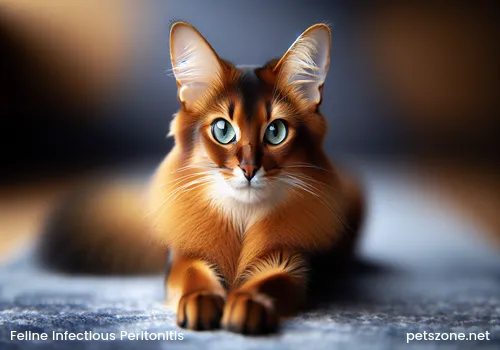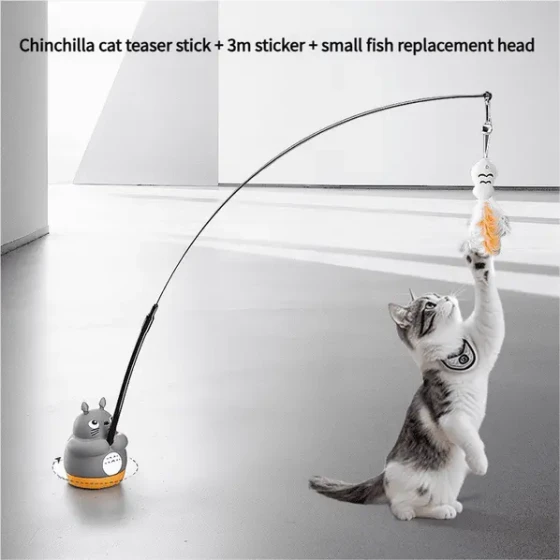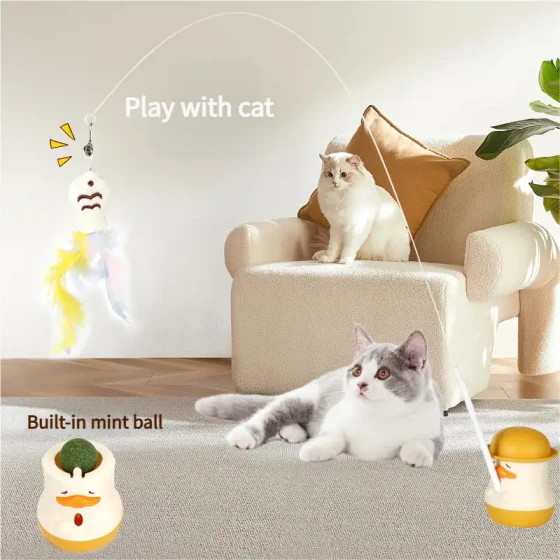Causes of Feline Infectious Peritonitis_Which Factors Easily Lead Cats to Infectious Peritonitis
Feline Infectious Peritonitis (FIP), abbreviated as FIP, is a fatal disease caused by the mutation of the feline coronavirus (FCoV). Although feline coronavirus is very common in cats, only a few cats develop the highly lethal FIP. Understanding the causes of FIP helps us better prevent and deal with this disease.

FIP is not directly caused by a FIP virus transmitted from cat to cat, but by mutation of the feline coronavirus carried within the cat under certain conditions. This mutated virus invades the cat’s white blood cells and spreads throughout the body’s organs through the white blood cells, triggering a strong inflammatory response, and ultimately leading to FIP. Although feline coronavirus is contagious and mainly transmitted through feces, the virus spread between cats is usually the enteric type coronavirus, which typically causes only mild diarrhea or upper respiratory symptoms, or even no symptoms at all. The mutated FIP virus (FIPV) itself is not contagious.
Which factors easily cause the feline coronavirus within cats to mutate and induce FIP? It is like "the last straw that breaks the camel's back" — the occurrence of virus mutation is closely related to multiple factors of the cat itself and environmental factors.
“Innate Conditions” of Susceptible Cats
Some cats seem to be naturally more vulnerable, related to their "innate conditions":
- Age: Kittens and elderly cats are high-risk groups for FIP. Studies show that about 70% of FIP cases occur in cats under one and a half years old, with 50% occurring in kittens under seven months. Kittens' immune systems are not yet fully developed, while elderly cats’ immune systems may have weakened, making them more prone to virus mutation and disease progression after infection with feline coronavirus. Imagine it like newborn babies and elderly people being more susceptible to colds; underdeveloped immunity is a key reason.
- Breed: Some purebred cats appear more prone to developing FIP, such as Ragdolls, Abyssinians, Bengals, Birmans, Himalayans, Maine Coons, and Rex cats. This may relate to genetic susceptibility, as their genetic makeup might make them more vulnerable to viral infection or abnormal immune responses.
- Genetics: Genetic factors play an important role in the occurrence of FIP, accounting for around half of the risk factors. Some cats may carry genes that make them more prone to feline coronavirus infection, viral mutation, or abnormal inflammatory responses to the virus.
- Sex: Some studies indicate that male cats may have a higher risk of FIP than females. This could relate to differences in sex hormone levels and subsequent immune responses.
“Catalysts” in the Environment
Besides factors intrinsic to the cat, the living environment also affects the development of FIP:
- Multi-cat environment: Cats living in environments with many cats, such as breeding catteries, shelters, or multi-cat households, have a significantly increased risk of FIP. In crowded environments, cats can more easily contact feline coronavirus through sharing litter boxes, feeding bowls, and water bowls, greatly increasing virus transmission. Frequent virus exposure also increases the chance of virus mutation.
- Stress: Various forms of stress are important factors triggering FIP. For cats, moving, going to a new home, neutering surgery, vaccination, the introduction of new pets, environmental changes, malnutrition, and concurrent illnesses may all cause stress reactions. Stress suppresses the cat’s immune system function, lowering resistance and making cats more vulnerable to viral invasion and mutation. Just like humans tend to get sick under stress, cats are the same.
“Small Actions” of the Virus Itself
Certain characteristics of the feline coronavirus itself also determine its potential to mutate into FIPV:
- High mutation rate: Feline coronavirus is an RNA virus, and the genome replication process of such viruses is prone to errors, giving the virus a very high mutation rate. This high variability provides the “opportunity” for the virus to develop more pathogenic mutant strains.
- Virus load and strains: High environmental viral load or infection of cats by certain feline coronavirus strains more prone to mutation can both increase the risk of FIP occurrence.
“The Last Straw”
Overall, the occurrence of FIP is not determined by a single factor but is the result of multiple factors working together. It can be understood that many cats carry the "seed" of feline coronavirus within them, but only when they encounter the suitable "soil" (susceptible cats) and "catalysts" (stress, multi-cat environments, etc.) does this "seed" mutate and ultimately grow into the "bad fruit" of FIP.
Although FIP was once considered a "death sentence" for cats, with scientific progress, effective treatments now exist. However, understanding and avoiding the above causes remains an important means of preventing FIP.
Frequently Asked Questions
- Does infection with feline coronavirus definitely lead to FIP?
Not necessarily. Most cats infected with feline coronavirus show only mild symptoms or none at all, and only a few develop FIP due to viral mutation. - How do I know if my cat carries feline coronavirus?
It can be determined by RT-PCR testing of fecal samples to check for feline coronavirus carriage and shedding. However, a positive test only indicates infection and does not guarantee development of FIP. - Is FIP contagious to other cats?
The FIP virus (FIPV) itself is not contagious. However, cats carrying feline coronavirus can transmit the virus through feces, potentially causing other cats to become infected with feline coronavirus. Reducing feline coronavirus spread in multi-cat environments is very important. - Can FIP be transmitted to humans or other animals?
Feline coronavirus is different from the coronavirus causing COVID-19 in humans and cannot be transmitted to humans or other animals.
Conclusion
FIP is a complex disease involving multiple factors. As cat owners, understanding these causes and providing cats with a stable and comfortable living environment, reducing stress, and maintaining hygiene in multi-cat environments plays a positive role in lowering the risk of FIP. Although we cannot completely control whether the virus mutates, through scientific care we can build a stronger health barrier for cats.
References:
Feline Infectious Peritonitis - Wikipedia, the free encyclopedia
Feline Infectious Peritonitis: FIP Risk Factors - FipMed
Feline Infectious Peritonitis - FIP in Cats - VCA Animal Hospitals
Feline infectious peritonitis (FIP) - International Cat Care
Neurological and Ocular FIP (FIP) - Pet Doctor Network
Feline Infectious Peritonitis | Cornell University College of Veterinary Medicine
Feline Infectious Peritonitis - MSD Veterinary Manual
Understanding Feline Infectious Peritonitis - Center for Companion Animal Health
Insights on feline infectious peritonitis risk factors and sampling strategies from polymerase chain reaction analysis of feline coronavirus in large-scale nationwide submissions in - AVMA Journals
Feline infectious peritonitis - Royal Canin Academy
Feline Infectious Peritonitis – DNA test for resistance - AnimaLabs
Feline Infectious Peritonitis - Infectious Diseases - MSD Veterinary Manual
HOW DOES STRESS PLAY A ROLE IN FIP OCCURENCES?
Why is FIP Difficult to Treat and What Are Its Risk Factors? - DVM360
Feline Infectious Peritonitis (FIP) By Dr. Lisa Fiorenza - Whippany, New Jersey
Feline Infectious Peritonitis(FIP): Symptoms, Causes, and Treatments - WebMD
Feline Infectious Peritonitis (FIP) - Login Cloud Veterinary
Common irritant causes of feline infectious peritonitis - Lucky FIP Treatment
Feline Infectious Peritonitis (FIP) - Cat Owners - Merck Veterinary Manual
When Cats Have FIP, How Should Pet Owners Respond? - Sina News
Breeders - SOCK FIP
9 Common FIP Comorbidities - FipMed
Fecal Feline Coronavirus RNA Shedding and Spike Gene Mutations in Cats with Feline Infectious Peritonitis Treated with GS-441524 - MDPI
Not Just a Patent, Understanding the "Cat Version of the Medicine God" - Intellectual Property Power
Feline Coronavirus & Feline Infectious Peritonitis - ABCD cats & vets
Feline Infectious Peritonitis - Wikipedia, the free encyclopedia (Chinese)
CN113648398A - A FIP Treatment Conditioning Paste and Preparation Method - Google Patents
Feline coronavirus with and without spike gene mutations detected by real-time RT-PCRs in cats with feline infectious peritonitis - PubMed Central
Updates on the genetics of FIP susceptibility- Part 2 - EveryCat Health Foundation
Feline Coronavirus (FCoV) RT-PCR - Cornell University College of Veterinary Medicine
Is FIP a Death Sentence, or Are We Sending Them to Death Ourselves? - Veterinary Pet Navigation
Clinical Changes and Outcomes of 146 Cases of Feline Infectious Peritonitis - Douban

-560x560.webp)



